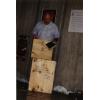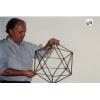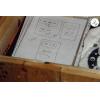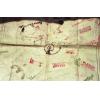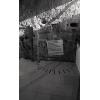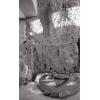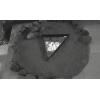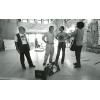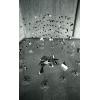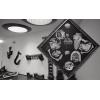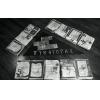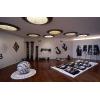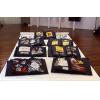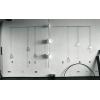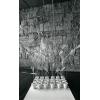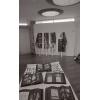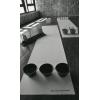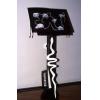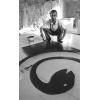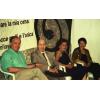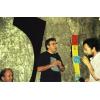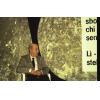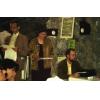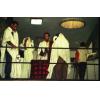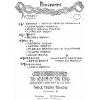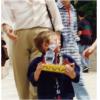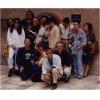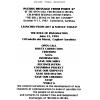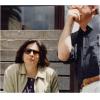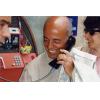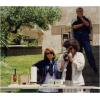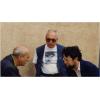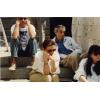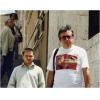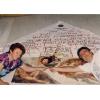On June 6 - 19 of 1994, at the Cittadella dei Musei, in Cagliari, it was held the event Art & Science Today: The Role of Imagination. It was organized by the University of Cagliari, in collaboration with the Dept. of Art and Art Professions and the Dept. of Music and Performing Arts of New York University, the College of Visual and Performing Arts of Northern Illinois University, the ISALTA International Society for the Advancement of Living Traditions in Art, the International Well Being and Reconciliation Committee and Plexus International. It was opened by the art exhibition Plexus 12 Years: Freedom, Imagination and Reconciliation, curated by Annamaria Janin, with artworks by Gaetano Brundu, Anna Saba, Antonello Dessi, Randi Hansen, Gabriella Locci, Maria Grazia Medda, Andrea Portas, and Fabrizio Bertuccioli. The art opening was closed with the presentation “Cagliari-Goree: The Route of Reconciliation” by Diam Gadiaga, president of the Senegal Immigrant Committee in Sardinia, with a reading of Alfa Diallo’s poems by Antonio Caboni. The day after, it was staged an electronic music laboratory, conducted by Guido Pegna and Lucio Garau. It was followed with an art action by Corrado Pani, Sara Scalas and Sabina Tatti.
On June 8th, it was made the presentation by David Ecker and Sandro Dernini of the exhibition of Plexus Black Box, made in New York by NYU Dept. of Art and Art Professions. David Boyle, Carlo Antonio Borghi and Antonio Caboni installed the show while also it was happening a round table, conducted by David Ecker, with Raimondo Demuro, Paola Bitti, Michele Bartonomen, on the living Nuraghic traditions of Sardinia and on the possibility that the bronze age Nuraghic towers were communication structures of a broader ancient planetary network. After, it was performed by the Shock Troupe Theatre, directed by David Boyle with Maria Pia Marsala as assistant director, the ritual play The Wisdom of the King, with Alessandra Menesini Nieddu, Maria Grazia Pintus, Carolina Melis, Michela Medda On June 9th, it presented the new establishing “Interdepartmental Well Being Study Centre on the Quality of Life“ of the University of Cagliari, coordinated by Franco Meloni, with Francesco Corongiu, Augusto Rinaldi, Bruno Anatra, Giulio Angioni, Piero Marongiu, Pippo Puggioni, Gianni Licheri, Carlo Muntoni, Francesco Aymerich, Guido Pegna, and Luigi Concas. It was followed by the round table The Role of Sardinia in the XXI Century, chaired by Pasquale Mistretta, Rector of the University, with Giovanni Lilliu, Sandro Dernini, Francesco Corongiu, Franco Meloni, Antonello Saba, Mario Pani and Giovanni Battista. On June 10th, David Ecker held his lecture on The primacy of imagination in the artistic and creative process that it was followed by the lecture of Stanley Medeja, dean of Northern Illinois University, on the Artistic process in a technological age. Ecker’s lecture was addressed to the fragmentation of the human spirit in contemporary life and on the common beliefs about “art” as a subjective process while instead “science” was believed to be the ideal of objectivity.
From David Ecker's lecture:
The conventional wisdom of modern times has it that art deals with the subjective while science seeks the objective side of our earthly existence. Scientists supposedly are bound by the ideal of objectivity, whether they investigate the facts of nature or the artifacts of a culture. Artists, on the other hand, have no such constraint; they are free to imagine and create what they will. If a creative imagination is the hallmark of the artist, then acute conceptual and observational skills are the signature of the scientist. On this view, imagining is dissociated from perceiving, feeling from knowing, valuing from understanding. Undoubtedly such beliefs about art and science persist because they hold a measure of truth for a community of believers. In the West, this is a rather large community indeed, for it includes educators, artists, scientists and philosophers as well as ordinary people. Now there is little point in challenging the veracity of folklore and practice. All of us, specialists and non-specialists alike, are informed and guided by vernacular patterns of thought and behaviour, and from these patterns we can learn much about our own personal and cultural identities. Rather, what I wish to address is the fragmentation of the human spirit in contemporary life and the subsequent decline of a sense of well-being in many of us. This is a consequence, I think, of the tendency toward increased specialization in the arts, sciences, medicine, and even the humanities. For example, a talented graduate art student can become a Master of Fine Art in two years of concentrated studio work in an American university, while a gifted young scholar or researcher may take three or more years to become a Doctor of Philosophy. Yet, because of departmental or program specialization requirements, the studio, the library, and the laboratory tend to be mutually exclusive domains of inquiry. MFA graduates leave the university with only a vague awareness of historical and cultural contexts other than their own, presumably having acquired the skills and knowledge it will take to make it in "the artworld." And the typical holder of the Ph.D. degree has received little or no training in philosophy, nor in any other discipline other than the chosen field of study. We should not be surprised, then, when the terminal product - the final exhibition of artwork or the dissertation - goes unappreciated or is thought to be unintelligible by professors in other departments of the university, who have their own codes and careers to cultivate. There is a parallel compartmentalization of values in the divergent activities of daily life. In urban America and in much of the world where ethnic, cultural, religious, and economic conflicts have already undermined allegiances and torn apart nations, we find a bifurcation of public and private morality. What counts for "political correctness" in the public sphere may sharply diverge from privately held attitudes and beliefs. So while my specific topic today is the role of imagination in artistic and scientific processes, I sincerely hope that my remarks will contribute to our collective efforts to project complementary rather than competing images of well-being for the 21st century.
After the conclusion of his lecture, David Ecker performed the opening of the Plexus Black Box. The program of June 10th was closed by a poetry reading made by Gisella Vacca and Elio Arthemalle. The day after it was held the round table on Art and Science, Today, moderated by Annamaria Janin, with the participation of Gillo Dofles, Michele Emmer, Franco Oppo, Tonino Casula, Ruggero Pierantoni, Lucio Saffaro. On June 12th , as part of the Plexus performance “Bring Your Serpent: Open Call for the 1995 Marconi Event”, Cicci Borghi and Sandro Dernini performed the departure of the Plexus Black Box of the Columbina Reconciliation Project, carried by Rodolfo Maria Dernini. Then, the Plexus Manifesto for Freedom was signed by the audience and a Marconi radio signal was sent in the ether by Guido Pegna, as a S.O.S. Marconi Open Call Bring Your Serpent for a freedom information route correction, recalling the point 6 of the 1992 Columbus Reconciliation Open Call: “We commit ourselves to the development of new channels of communication to make it possible for the people of all nations and cultures to conduct free and independent exchanges of “Reconciliation”.
On June 13, David Ecker and Sandro Dernini met the rector of the University of Cagliari and it was agreed to sign a protocol of agreement between New York University and the University of Cagliari for the development of a cultural navigation project tobe started in 1995 as proposed by John Gilbert.
From the proposalWiring the World: Navigating Global Cultures through Technology and the Arts by John Gilbert:
This is a proposal to host an international conference in the Summer of 1995 entitled "Wiring the World: Navigating Global Cultures through Technology and the Arts”, to be followed by a global arts event in the Fall of 1995...The conference and event would commemorate the lOOth anniversary of Marconi’s successful experiment in the invention of wireless communication. Marconi had a musical background, and his study of the work of Hertz and Helmholtz led him to the idea that he could transmit frequencies over the air. His discovery in 1895 led to the radio and the communications revolution of the twentieth century. Current development of technologies has brought about concepts such as the development of interactive electronic super highway and distance teaching/learning. and distance performance which are likely to be as revolutionary for the 21st Century as Marconi's work was for this century...
Significance of the Project
Plexus International, an international movement of artists, community groups, and cultural organizations founded by Dr. Sandro Dernini has played a seminal role in the conception and realization of an interdisciplinary, cross-cultural multi-arts event such as described in this proposal. In the context of its decade long effort to create telecommunication art events, the Marconi Centennial is the latest of its interactive telecommunication activities. The focus of Plexus International on the arts as a means to bring communities closer together, all the previous and current activities of this movement have had substantial involvement from the local (Lower East Side) community and cultural groups, organizations, and individuals. This project would engender a spirit of cooperation and collaboration, underscoring NYU's commitment to its urban setting and its determination to enhance the quality of life in the city. The activities proposed here are a collaborative attempt to raise the consciousness in the world community about the interdependencies of the arts, the well-being of individuals,, and the reconciliation of cultural differences through the extension and interaction of cultures and communities through distanced learning and collaborative arts events now available through expanding technologies. In addition, the relationship of technology and the arts has a deep and long-standing tradition. Artistic expression has called for the development of technique and technology and technologies have empowered artists to create new artforms. The proposed conference allows us to explore this collaborative relationship and to push the limits of existing technology to serve artistic and cultural needs.
On June 14, David Ecker, Stanley Medeja and Sandro Dernini met Ubaldo Badas, director of the archeological Nuraghic museum of Villanovaforru, in order to reinforce the ISALTA- Mediterranea collaboration towards the advancement of the living artistic and cultural traditions of Sardinia , that was proposed by David Ecker in his first visitin January of 1990.
On November 14, it was formally established by the Rector Pasquale Mistretta the Interdepartmental Well Being Study Centre on the Quality of Life of the University of Cagliari, with Franco Meloni as coordinator, and Bruno Anatra, Francesco Corongiu, Pippo Puggioni and Augusto Rinaldi as members of the Scientific Committee. Sandro Dernini served as consultant. The Centre's objective was to identify and study sensitive indicators to variations in relationships to different components of the society that influence the quality of life and to activate interactive exchanges among them. The Centre's aim was to act as a interdisciplinary and multicultural structure connecting different realities within the university and the society in general, a link between disciplines and cultures quite far apart.



